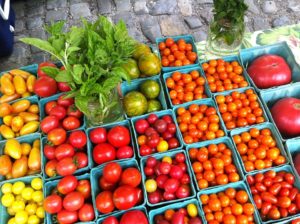

Produce at farmer’s markets are all locally grown and can often have food that isn’t normally featured in stores. Most markets run until mid-November.
Krystina Primack | Staff Writer
09/13/2018
With several days of September now behind us, the official beginning of fall is fast approaching. Although we’ve had quite a bit of disparity between the recent muggy summer forecasts and the much-anticipated arrival of autumn weather, the varying temperatures still haven’t discouraged members of our community from visiting the city’s numerous farmers markets.
Traditionally beginning in mid-May and running until late-October each year, known as “farmers market season,” is currently in full-swing, prompting Yinzers from the heart of the city and beyond to venture out and see what the participating farmers and vendors have to offer.
Whether you live on campus or commute to Duquesne, the possibility of finding a market near you is high, as several of the neighborhoods in and around Pittsburgh are proud homes to many farmers markets during the season.
Nearly 50 such markets regularly operate at any given time, including locations in Lawrenceville, Bloomfield, Mt. Lebanon and Downtown, to name a few. Furthermore, 21 of the farmers markets in operation give customers the option to exchange money for tokens to use for shopping, making the experience a bit simpler for all involved. A complete list of locations and schedules can be found online by searching “The Ultimate Guide to Pittsburgh Farmers Markets: 2018.”
Most of these locations are open for one or two days a week, and stay open at different times of the day, allowing people with busy schedules some flexibility to visit a farmers market as they wish.
In fact, increased accessibility to the communities that they serve is one of the reasons that farmers markets have seen a rise in popularity in recent years. Malaysia Smith of the Bloomfield Saturday Market illustrates this point by giving us an idea of how many people show interest in attending.
“We see [about] 800 people showing up on Saturdays, and we have various locations: [one] in East Liberty, and the biggest one is downtown, located in Market Square, and there they see over 2,000 people coming in each Saturday,” Smith said.
It comes as no surprise that people would be drawn to farmers markets. It’s a myth that produce from farmers markets is overpriced – rather, fruits and vegetables can be up to 40 percent cheaper there than in grocery stores. There will generally be a few items that run more expensive, such as eggs and potatoes, because these items exist in economies of scale in ways that others do not. But on the whole, farmers markets have more control over where their products are sourced, and therefore are able to present more affordable options for entire communities. As students, chances to eat healthy without breaking the budget are always worth further consideration.
Locally-sourced produce is fresher than what we might be used to purchasing from the grocery store, and is often considered to be more nutritious than produce that has to be grown and shipped from great distances. There are different kinds of fruits and vegetables to choose from at farmers markets as well, beyond what’s offered in stores only, which can be limited by what happens to be popular at the time.
But beyond the obvious perks about the produce itself, there are also many benefits to members of the community that are the result of the presence of farmers markets. For example, in larger cities like Pittsburgh, where available land can be scarce, it can be difficult for people to grow their own fresh produce, let alone have adequate access to it elsewhere. For some, this is simply a matter of preference.
As Dan Forrider of Woolf Farms says about the produce he oversees, “These are from the farm, we bring the farm to you. There’s a lot of people that enjoy the fresh-off-the-farm, not mass-produced for the stores types … It’s the benefit of having fresh produce in a city where you don’t have room to grow your own.”
For other people, however, being able to have affordable access to produce is essential to building and maintaining a healthy lifestyle, and forming responsible eating habits, which in turn influences many factors of a community’s overall well being. In the past, being able to utilize these healthy food options was exceedingly difficult, and often thought to be a privilege of the affluent. Luckily, that notion is now changing for the better, and more people are getting to experience the long-term advantages of those changes.
“[Farmers markets are] giving people the ability in each community to make healthy choices,” Smith said, “Healthy choices benefit families. People who are receiving [food stamps] are able to make healthy choices for themselves, and it’s also a discrete process, [since] there’s such a huge stereotype with food stamps. So they can come here and they can get tokens, and no one knows that they are on food stamps.”
Local non-profit organizations, such as Just Harvest of Allegheny County, acknowledge that many individuals and families in the city experience food insecurity. Just Harvest strives to make shopping for produce at farmers markets a simpler and more widely available experience.
The next time you’re down at Market Square on a Saturday afternoon, or perhaps spending a nice Sunday morning in Squirrel Hill, it’s definitely worth taking the time to stop in and visit one of the neighborhood farmers markets along the way – because not only will you find a variety of healthy foods available to purchase, but you’re also contributing to local farmers, to the community, and to its wellbeing.




